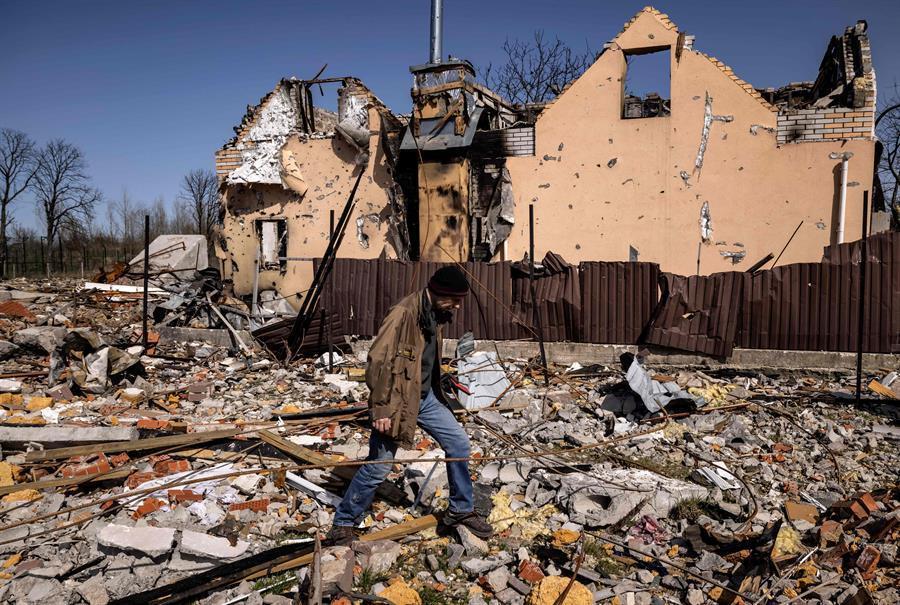
Russia’s defense ministry warned on April 15 it will intensify attacks on the Ukrainian capital Kiev in response to strikes on Russian soil, after accusing Ukraine of targeting Russian border towns.
"The number and scale of missile strikes against targets in Kiev will increase in response to any terrorist attacks or sabotage committed by the Kiev nationalist regime on Russian territory," the ministry said in its daily update.
It added that Russian troops hit a "military" factory outside Kiev late Thursday using Kalibr sea-based long-range missiles.
"As a result of the strike on the Zhulyansky machine-building plant ’Vizar’, the workshops for the production and repair of long-range and medium-range anti-aircraft missile systems, as well as anti-ship missiles, were destroyed," the ministry said.
The ministry also said its S-400 missile system shot down a Ukrainian Mi-8 helicopter that carried out "an attack on civilians in the locality of Klimovo in Bryansk region on April 14".
On Thursday, Moscow accused Ukraine of sending helicopters to bomb a village in Russia’s Bryansk region -- not far from the border with Ukraine -- injuring eight people.
Later the same day, the head of Russia’s Belgorod region said a village close to the border was shelled by Ukraine, while residents from this and a nearby village had been evacuated as a precaution.
Kiev has denied the helicopter attack, instead accusing Russia of staging the incidents to stir up "anti-Ukrainian hysteria" in the country.
Separately, the Russian defence ministry said Friday its strategic rocket forces "eliminated up to 30 Polish mercenaries" in a strike on the village of Izyumskoe, not far from the city of Kharkiv in northeastern Ukraine.
It said the mercenaries belonged to "a private Polish military company", but did not say whether any Ukrainian troops were also killed.
The reported rocket strike was one of the biggest against foreign targets in Ukraine since another missile killed what the Russian military claimed was up to 180 foreign mercenaries in Western Ukraine last month.
Kiev said at the time that only Ukrainian soldiers were killed.
Meanwhile, Russia’s Black Sea flagship sank on April 14 after an explosion and fire that Ukraine claimed was a successful missile strike, as the Kremlin accused Kiev of targeting its citizens in sorties across the border.
The Moskva missile cruiser had been leading Russia’s naval effort in the seven-week conflict, in which civilian killings have sparked accusations of genocide from the United States and others.
Russia’s defense ministry said the blast on the vessel was the result of exploding ammunition and added that the resulting damage had caused it to "lose its balance" as it was being towed to port.
"Given the choppy seas, the vessel sank," the Russian state news agency TASS quoted the ministry as saying.
On the Ukrainian side, Odessa military spokesman Sergey Bratchuk said the ship had been hit by domestic Neptune cruise missiles.
In Washington, Pentagon spokesman John Kirby said he was unable to verify either version, but stressed that the sinking of the Moskva dealt a "big blow" to the Black Sea fleet.
The fleet has been blockading the besieged southern port city of Mariupol, where Russian officials say they are in full control.
Following its pullout from northern Ukraine earlier this month after failing to take the capital, Russia is refocusing on the east, with Kiev warning of bloody new clashes to come in the Donbas region.
And with Russian setbacks in the war mounting, the CIA warned that President Vladimir Putin could resort to using a tactical or low-yield nuclear weapon.
"We’re obviously very concerned. I know President Biden is deeply concerned about avoiding a third world war, about avoiding a threshold in which, you know, nuclear conflict becomes possible," CIA director William Burns said in a speech in Atlanta.
But the United States is yet to see "a lot of practical evidence" of actual deployments that would cause more worry, he added.
Seizing Donbas, where Russian-backed separatists control the Donetsk and Lugansk areas, would allow Moscow to create a southern corridor to the occupied Crimean peninsula.
But rain that has been battering the region for days could favour Ukraine in its fight against invading Russian forces, a senior Pentagon official said Thursday.
"The fact that the ground is softer will make it harder for them to do anything off of paved highways," said the official, who spoke under condition of anonymity.
In what appeared to be its first official accusation of abuses targeting Russians, the Kremlin said at least six air strikes had hit residential buildings in the border region of Bryansk, wounding seven people including a toddler.
"Using two military helicopters carrying heavy weaponry, Ukrainian armed forces illegally entered Russian air space," Russia’s Investigative Committee said.